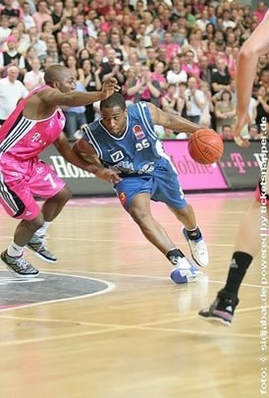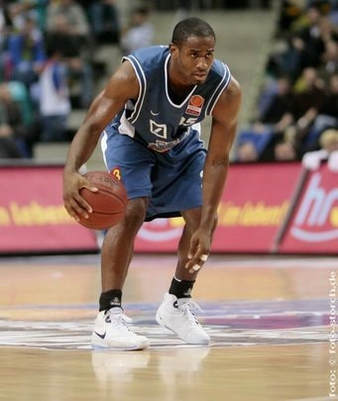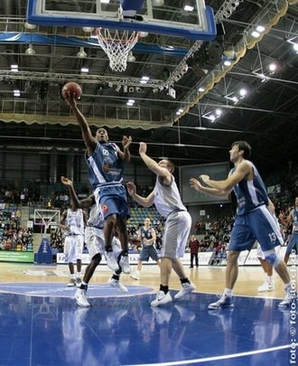By Tom SadlerCoach Sadler catches up with Jimmie Hunt to pass along some guidance for aspriring professional players...  I recently caught up with a good friend of mine Jimmie Hunt, a 12 year veteran of professional basketball to talk about his life as a pro, how he keeps him self in shape, his advice to players that want a career in the game, and how he adjusted to living a life overseas. Hunt, a former graduate of Franklin Pierce University was one of North East’s 10 most exciting players. A 6’2 combo guard who ranks 9th all time in points and is amongst the top 15 all time for assists. He has played in top-level competitions all over Europe in countries such as Germany, Slovenia, and Bulgaria. Through his career, Hunt has helped lead his teams to a number of finals. Along the way he had received a number of great personal achievements such as MVP’S and scoring titles, as well as being a 9 time All-Star in 4 different countries. Q. How have you adjusted to life overseas? And what would be the hardest adjustment you’ve had to make? Adjustment to life overseas is a process, but after time it becomes easier. I personally think the first year is the toughest. Different culture, food, way of life, different basketball style, friends etc. It is a big life change. For me, the adjustment came with really trying to meet people, learning the culture and traditions, trying new things, exploring new places, and finding activities that I like to do in my free time. Now I have learned to appreciate new places, and it broadened my mind to how big and great the world is. The hardest adjustment is being away from your family and friends. It’s very hard and can really affect your mood and focus. Nowadays, technology helps because you can always be in contact and connected with friends and family back home. Q. How would you compare the leagues you’ve played in as a pro to the collegiate level? I would say that the professional game and college game is a lot different. College is very fast, very athletic, and you are playing with a group of guys that are your age (18 -23). I think the goal in college is to be faster and stronger than other teams. Professional ball is slower but more strategic. The goal is to find the easiest way to score. It’s about creating mismatches and exploiting them. Pro level is also more demanding in your personal effort. It’s a long season and an everyday grind. Q. What does your summer training regimen look like? My summer regimen has changed over the years. Now I am an older player so I try to take care of my body as much as possible. Lifting weights is a big part of my training now. When I was younger I would get up early for a morning run to start the day, which was about 2 to 3 miles, 5 times a week. I would make sure to get a good stretch after and eat a well-balanced breakfast. Now that I’m older, I don't run as much but I love to swim and I ride the bike. Both are great for cardio and keep the legs strong and in shape. In the afternoon, usually in the summer my friends (other professional and college players) are home, so we usually meet up at a gym to lift weights and then play. I play around 3 times a week. The other days, I used to train myself individually. Shoot a lot of shots, work on ball handling and foot work. Sunday is my rest day. Q. What’s the best advice you’ve ever had from a coach/mentor?
My father trained me as a kid and mentored me. And he would always tell me that the only person that could stop me is me. As I got older, I began to understand this more. I realised that basketball is a mental game just as much as a physical game, so I would train very hard and always be prepared. I would also study the game, study other players and teams so that I would always be ready and find a way to be effective on the court. This advice my father told me is very true and stuck with me throughout my career. If I didn’t work hard or prepare, then all I was actually doing was stopping my own progress and development. Q. What’s basketball taught you that you carry over into the rest of your life? Basketball has taught me many different things. I will list a couple that are really important to me. One thing I learned was working with other people. Basketball is a team sport, and it’s an interesting challenge at times interacting and motivating others as well as keeping yourself focused and motivated to achieve a goal. In life, we deal with different situations like this, whether it’s dealing with siblings, a spouse, or even just your friends. The same principles need to be applied. I have also learned how to deal with the highs and lows of winning and losing. Basketball is an emotional sport. It's very hard to keep control of your feelings in certain situations. But in the game without control you can hurt not only your chances for success, but also of those around you. In life, we deal with many different things that a majority of the time we have no control over. We can only control ourselves and our own emotions, as well as encouraging others around us. One last very important lesson I learned was how to be completely focused and dedicated. Basketball takes a big commitment and to be really successful, much is required. I believe that this same commitment is needed for most aspects of your life in order to be successful. I am very pleased to have learned this quality, and to know what it really requires. Throughout my career in basketball, the times I was not as focused, the results would be very evident. This was a great indicator to get back on track. Now I can apply this to my life and whatever I am committed to; the results usually workout in my favour. Q. What advice would you give to younger players that are looking to play college and hope to one day have a career? My advice for young players would be to really set in your mind. If you really want to chase this goal and life, your dedication and will has to be your main focus everyday on and off the court. If you research the best players, the proof is evident. The more you dedicate yourself, the better the results will be. There will be many distractions and opportunities to do things that are not necessarily so harmful, but ultimately do nothing to further your progress. I am not saying do not enjoy your life, but the joy you will get from achieving your lifelong goals and commitment to the game is much more fulfilling and comforting. Comments are closed.
|
Archives
June 2019
|



 RSS Feed
RSS Feed